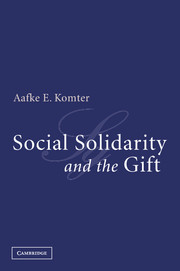Introduction
Published online by Cambridge University Press: 24 November 2009
Summary
More profound insights into the nature of solidarity and trust can be expected from applying the theory of the gift to ourselves.
(Mary Douglas 1990: xv)Is there a similarity between giving a birthday present and doing volunteer work? Between donating blood and being a union member? In short: what do gifts and social solidarity have in common? Giving to a beggar or to charity is an act of solidarity. When we are giving care or help to our elderly parents, we are demonstrating social solidarity; at the same time we are giving a (nonmaterial) gift to another person. The term solidarity, apart from its ideological use, for instance in the socialist and communist jargon, and apart from its normative commonsense use by humanitarian organizations, political parties, or the church, has traditionally been used in a descriptive and analytic way, with the sociological approach of Emile Durkheim providing the first scientific attempt at theory development.
Solidarity derives from the Latin solidare – to make firm, to combine parts to form a strong whole. In contrast to the term solidarity, the word gift has an agonistic origin: the German Gift came from the Greek dosis and Latin dos, which had replaced the former venenum because of the need for a euphemism. Whereas solidarity is an abstract concept that remains abstract even in its most common uses (one dictionary explanation of solidarity is, for instance, a feeling of togetherness and willingness to take the consequences of that), gift giving is often associated with concrete and material objects exchanged on certain occasions between people having a certain type of relationship to each other.
- Type
- Chapter
- Information
- Social Solidarity and the Gift , pp. 1 - 12Publisher: Cambridge University PressPrint publication year: 2004



